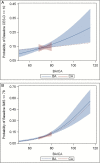Biological Age, Not Chronological Age, Is Associated with Late-Life Depression
- PMID: 28958059
- PMCID: PMC6132120
- DOI: 10.1093/gerona/glx162
Biological Age, Not Chronological Age, Is Associated with Late-Life Depression
Abstract
Background: The pathophysiology of late-life depression (LLD) is complex and heterogeneous, with age-related processes implicated in its pathogenesis. This study examined the cross-sectional and longitudinal association between depressive symptoms and a baseline multibiomarker algorithm of biological age (BA) that aggregates indicators of inflammatory, metabolic, cardiovascular, lung, liver, and kidney functioning.
Method: Data were analyzed from 2,776 men and women from the prospective observational Health Aging and Body Composition Study, who had both evaluable chronological age (CA) and BA. Depressive symptoms were assessed using the Center for Epidemiologic Studies Depression (CES-D) scale.
Results: A covariate-adjusted regression model showed that BA (B = 0.03, p = .0471) but not CA (B = -0.01, p = .7185) is associated with baseline CES-D scores. The mean baseline BA for individuals with a CES-D ≥ 10 was 1.28 years greater than in those with a CES-D < 10. Comparatively, there is only a 0.05-year difference in mean CA between the two depression groups. A covariate-adjusted longitudinal model found that baseline BA predicts CES-D score at follow-up (B = 0.04, p = .0058), whereas CA does not (B = 0.03, p = .4125). Additionally, an older BA significantly predicted a CES-D ≥ 10 (B = 0.02, p = .032) over a 10-year period.
Conclusions: A multibiomarker index of an older adult's BA outperformed their CA in predicting subsequent increased and clinically significant depressive symptoms. This result supports the evolving view of LLD as a brain disorder resulting from deleterious age-associated changes across numerous physiological systems.
Figures

References
-
- Rothschild AJ. The diagnosis and treatment of late-life depression. J Clin Psychiatry. 1996;57(suppl 5):5–11. - PubMed
-
- Conwell Y, Lyness JM, Duberstein P et al. Completed suicide among older patients in primary care practices: a controlled study. J Am Geriatr Soc. 2000;48:23–29. - PubMed
-
- Alexopoulos GS, Meyers BS, Young RC et al. Recovery in geriatric depression. Arch Gen Psychiatry. 1996;53:305–312. - PubMed
Publication types
MeSH terms
Substances
Grants and funding
LinkOut - more resources
Full Text Sources
Other Literature Sources
Medical

